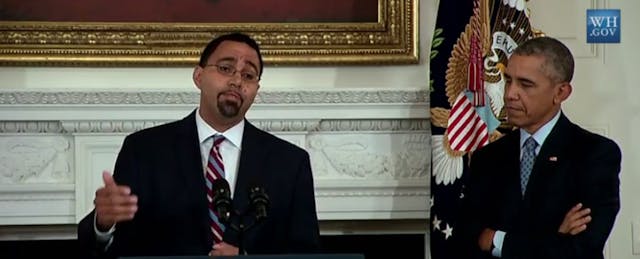In his official press conference on Friday, October 2, President Barack Obama announced that John B. King, Jr. would take over the role of Secretary of Education from Arne Duncan. Obama sang King’s praises, saying “John has been an educator all his life--a teacher, a principal… he’s the right man to lead the department.”
Arne Duncan and John King are similar in that they both support a number of reform strategies, including charter schools, Common Core, and stringent teacher evaluation. As such, King may face some of the same challenges and criticisms as Duncan going forward. But Mr. King is no stranger to controversy, and while he may occupy his position for only a year, depending on the upcoming 2016 presidential election, he’s already getting his share of support and criticism in the press and in social media.
King’s Background
King was born in Brooklyn to an African-American educator and a Puerto Rican New York City public school teacher. His father was the first African-American principal of a public school in Brooklyn.
When speaking about his upbringing at Obama’s press conference, King shared personal heartbreak from his youth: “I lost my mom when I was 8, my dad when I was 12.” According to King, “NYC public school teachers are the reason that I stayed alive.” King went to acquire an undergraduate degree from Harvard, a law degree from Yale, and a doctorate in education from Columbia.
A proponent of charter schools, King started Boston’s Roxbury Prep charter school in 1999 and acted as Managing Director of Uncommon Schools beginning in 2005. Boston Magazine cited Roxbury’s high state standardized test scores in 2010: “Poor black and Latino kids from Roxbury are whipping the rest of Massachusetts on the MCAS.”
King entered New York state’s education department in 2009, and by 2011 had become its commissioner, where he oversaw the adoption of Common Core standards--which the New York Times referred to as “the most significant change during his tenure.” King joined the US Department of Education as a senior advisor in January 2015, which Obama cited positively in speech at the press conference: “He’s got a great team already at the Department of Education. His family is equally cool and good-looking.”
Not All Gold Stars in New York
Back in New York, having a good-looking family is not what King is predominantly remembered for. Rather, individuals might recall more of his stance on Common Core and his overseeing of the introduction of new teacher evaluations, which some New Yorkers and commentators found extreme.
While serving as Commissioner of Education of the State of New York, King introduced evaluation partially based on students’ progress on state standardized tests. Couple that with more difficult exams for prospective teaching candidates, and teacher certifications dropped by 20 percent in 2014. Vocal academic Diane Ravitch wrote on the morning of October 2, 2015 that King was extremely controversial “because of his dogged support for the Common Core, for high-stakes testing, and for a badly flawed teacher evaluation system.”
Also concerned about Obama’s appointment of King are several teachers’ unions and the NYS Allies for Public Education, a parent organization. Last year, the New York State United Teachers approved a vote of no confidence and called for King's removal. King was criticized by the union for “the implementation of Common Core learning standards and accused of failing to listen to teachers on ‘professional issues,’” according to AuburnPub.com.
Critics of the “reformer movement” are also questioning King’s ability to lead a nation of public school educators and learners given his apparent charter school proclivities. He supports “the type of draconian discipline policies for which many charters have become notorious” writes one New York public school teacher.
Looking Forward
While King has received a flurry of both support and criticism on social media in the last few hours alone, commentators are also contributing thoughts on what topics will prove to be most challenging for King going forward.
“Here’s one big question mark: the Elementary and Secondary Education Act (essentially No Child Left Behind) reauthorization. Duncan didn’t show really any enthusiasm for that, and I don’t think we know what King will do on that either,” Michael Horn, co-founder of the Clayton Christensen Institute, told EdSurge in an interview.
Tom Murray of the Alliance for Excellent Education agrees: “It’s quite possible that the US Department of Education lose some of its power moving forward on that.”
Whether constituents are comfortable with Obama’s appointment or not, perhaps the biggest challenge facing King can be summed up in one word: time. King will likely only be in power for a year. Do you think that’s enough time for him to make lasting change? Leave comments below.
For Further EdSurge Coverage:
Arne Duncan Is Stepping Down; John B. King Nominated as US Secretary of Education
What the White House Press Corp Didn’t Ask About Arne Duncan’s Resignation
Timeline: Notable Moments Along Arne Duncan's Education Journey


